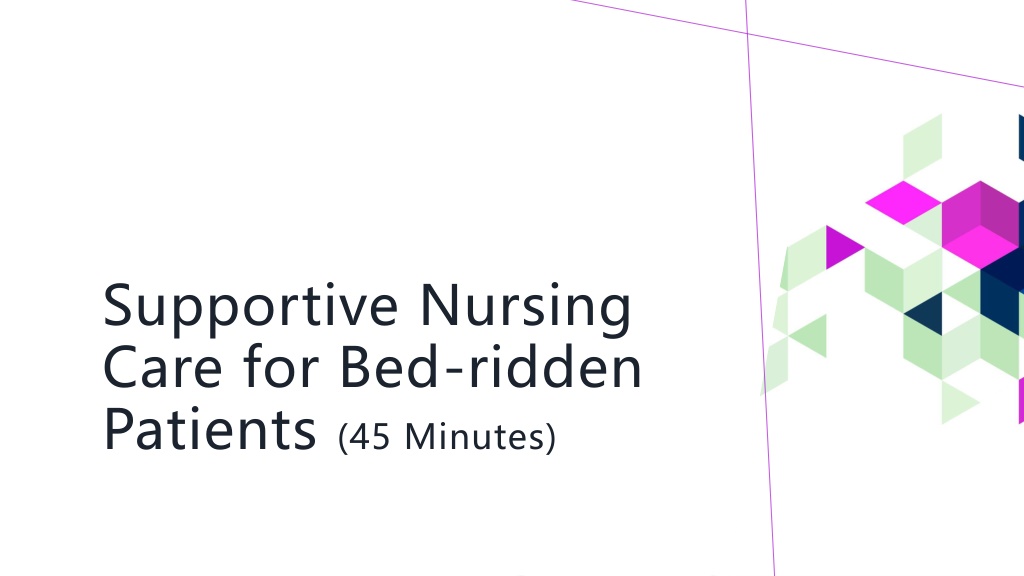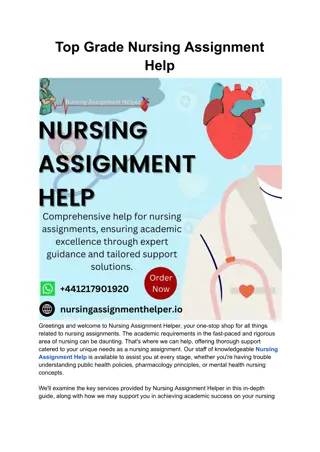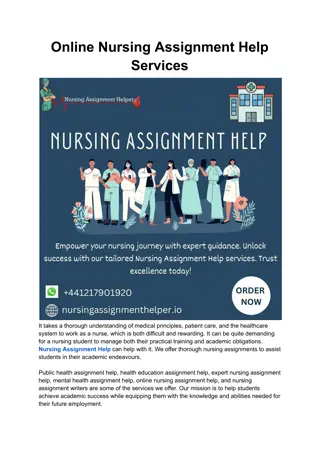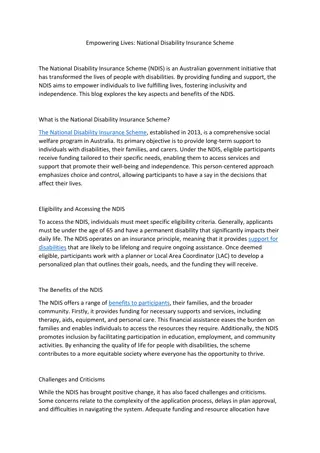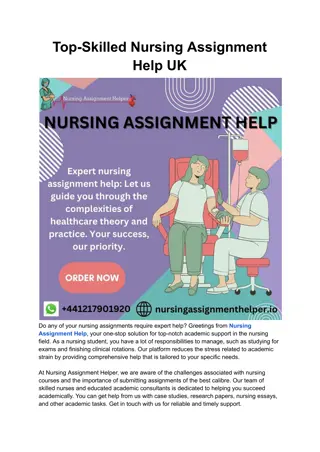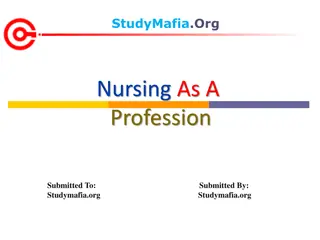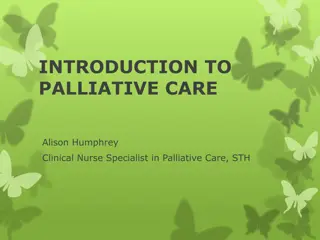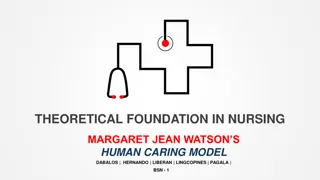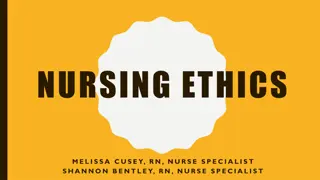Comprehensive Supportive Nursing Care for Bed-ridden Patients - A Holistic Approach
Providing supportive nursing care for bed-ridden patients like Mr. Thomas, who suffered a Cerebro Vascular Accident, requires addressing various health complications such as pressure sores, constipation, urinary incontinence, and more. Understanding the impact of dependence on the patient's life and supporting them and their caregivers through this challenging time is crucial. Nursing care, nutritional needs, psychosocial support, and a management plan for common issues are essential components in ensuring holistic care for bed-ridden patients.
Download Presentation

Please find below an Image/Link to download the presentation.
The content on the website is provided AS IS for your information and personal use only. It may not be sold, licensed, or shared on other websites without obtaining consent from the author. Download presentation by click this link. If you encounter any issues during the download, it is possible that the publisher has removed the file from their server.
E N D
Presentation Transcript
Supportive Nursing Care for Bed-ridden Patients (45 Minutes)
Mr Thomas, 65-year-old male, suffered Cerebro Vascular Accident 2 weeks ago. He developed hemiplegia and aphasia. He was catheterised in the hospital. Since he aspirated oral feeds, a nasogastric tube was placed for feeding. He is conscious but is unable to communicate. After conservative management at the hospital, he was discharged home with a urinary catheter, nasogastric tube, antihypertensives and blood thinners. 1. What health complications do you expect in Mr Thomas? 2. How does dependence affect his life? 3. How can you support him and his carers? Discuss in groups (10 minutes) and Report back (5 minutes) Activity (15 minutes)
Pressure sores Constipation and faecal incontinence Urinary incontinence and Urinary tract infection Vomiting, Aspiration and Nasogastric tube feeding Malnutrition Contractures and wasting Isolation Depression Common Problems
Dependence on others and role reversal Having to depend helplessly on others for activities of daily living can be a frustrating experience The distress due to role reversal in the family/community can lead to anger, resentment, frustration and depression Key Functional/ emotional issues
Nursing care (Head to toe care including Oral care, Eye care, Skin care and Nail care) Nutritional needs Psychosocial needs (Communication and Companionship) Basic Needs of a bed-ridden patient
Bed-ridden Patient Management Plan Plan to prevent/ manage Pressure sores Constipation Faecal incontinence Urinary incontinence and Urinary tract infection Urinary tract infection Vomiting and Aspiration Muscle wasting and contractures Isolation
Very common in bedridden patients Due to Poor mobility Lack of dietary fibre if on nasogastric tube feeding. Management Active and passive exercises to promote gut motility. Encouraging carers to provide thoroughly ground vegetables as a source of fibre Laxative support, if necessary Constipation
Can cause Peri-anal excoriations Secondary skin infections Bed sores Negative impact on patients sense of wellbeing Management Bowel routine to be regularised (preferably with laxatives). Suppositories are more helpful as the onset of action is predictable Long-term use of diapers can cause rashes, infections and excoriations. Faecal Incontinence
Can lead to Pressure sores Skin excoriations Secondary fungal and bacterial infection Poor sense of well-being Caregiver conflicts Urinary Incontinence
Correct the reversible causes Constipation Urinary Tract Infection Poor access to toilet/ Privacy issues Drainage of urine Condom drainage is preferred over indwelling catheter whenever possible Indwelling catheters are associated with a higher incidence of urinary tract infections. Ensure regular bowel evacuation in patients with the indwelling catheter Distended rectum and impacted stool can occlude the catheter and obstruct the urinary flow Urinary Incontinence - Management
Presents as dysuria, cloudy urine, fever with chills and vomiting. Require antibiotic therapy. Prevention Plenty of oral fluids, minimum of 2L/day unless contraindicated Prefer condom drainage over indwelling catheters in patients with incontinence Regularize bowel evacuation Urinary Tract Infection
Vomiting has the risk of aspiration Vomiting in bedridden patients can cause life-threatening aspiration Nasogastric feeds can be spaced as 200 to 250mL every 2 hours. Giving large bolus feeds should be avoided. The patient should be turned to a lateral position if/ when she/ he vomits The underlying cause of the vomiting should be identified and treated.
Muscle Wasting and Contractures Disuse atrophy is common in bedridden patients. Characterized by loss of skeletal muscle mass and function severely Affects the quality of life. Increases the demand for long term care.
Physiotherapy and nutritional support. Range of motion exercise, when performed regularly, can prevent contracture of joints. Regular physiotherapy Prevents muscle wasting/ contractures Reduces the risk of constipation Reduces the risk of gastric stasis. Prevention of Muscle Wasting and Contractures
Range of motion is the term used to describe the amount of movement at each joint. Every joint in the body has a "normal" range of motion. ROM exercises preserve flexibility and mobility of the joints Active ROM exercises Stretching exercises that the patients can do themselves if they still have the muscle strength to move their joints through complete ranges Passive ROM exercises for joints which can not be moved through complete ranges by the patients themselves Done with the help of the caregiver Range of Motion (ROM) exercises
To be done at least once every day Start by exercising each joint 2-3 times and gradually build up to regular 10-12 times Try to achieve the full range of movement. Move only to the point of resistance and hold for 30 seconds. Do not force the movement. Move slowly, watching the patient's face for a response. Stop when the patient shows any sign of pain Keep limbs supported throughout the motion. ROM Exercises - Guidelines
